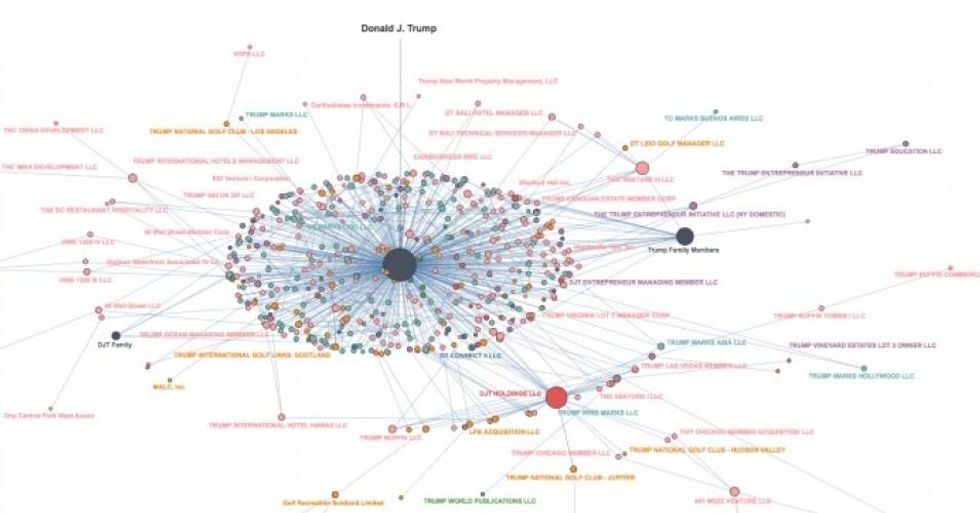Seemingly adhering to the Nixonian adage that "if the president does it, that means it is not illegal," the Trump team continues to stand by the legitimacy of the incoming president keeping his business ties.
When asked by MSNBC's Katy Turr during his first official news conference on Thursday if President-elect Donald Trump would release, if not his tax returns, at least a list of those people or institutions to whom he is indebted, incoming press secretary Sean Spicer made clear that information would not be forthcoming.
"I think that question has been asked and answered a hundred times," Spicer said. "The President-elect has made it very clear: he has no conflicts by law. He has gone above and beyond in terms of making sure that he separates himself from business--hands it over to his kids--and then put in place a very, very vigorous plan to make sure no conflicts of interest occur."
That very same plan, which includes handing the Trump Organization over to Trump's two grown sons, was decried as "meaningless" last week by the government's top ethics monitor.
Spicer then repeated the phrase, "he has no conflicts by law," and argued that what the president-elect "has done is extraordinary to ensure that his focus is entirely on helping this country move forward." Without allowing follow-up, Spicer then moved on to the next questioner.
Assurances aside, investigations into Trump's business affairs continue to produce an increasingly complex web of affiliations.
One day before the presidential inauguration will take place, both the Wall Street Journal and CNBC on Thursday published new visual mappings of the president-elect's potential conflicts of interest.
The analysis, based on filings with the Office of Government Ethics from May 2016 and July 2015, both reveal that Trump and his family may hold more than 500 such conflicts, placing the president-elect in an "unprecedented position," according to WSJ.
These documents, CNBC economics reporter John W. Schoen points out, provide "only a snapshot of his holdings and business connections, largely because the rules governing disclosure of financial interests did not anticipate a candidate like Trump."
Trump and his surrogates justify his plan by pointing to Title 18, Section 208 of the U.S. Code, which governs the financial interests of government employees, and specifically exempts "the President, the Vice President, a Member of Congress, or a Federal judge," Schoen observes.
But in a Nation op-ed on Thursday, Fordham University associate professor of law and former U.S. congressional candidate Zephyr Teachout argues that Trump will be guilty of what the founding founders called "treachery," or "in foreign pay."
"On the day that Donald Trump takes office, his family will be 'in foreign pay,'" Teachout writes, explaining how his "decision to keep his business open is an invitation to strategic efforts by other countries."
For example, she notes,
The Trump Organization will be getting a substantial paycheck from the Chinese government by way of the Industrial and Commercial Bank of China, the largest tenant of Trump Tower. Trump will also be paying interest to China: He's invested in a partnership that borrowed $950 million from lenders including the state-owned Bank of China. Each of these roles--as landlord and debtor--puts Trump and the country in a position of vulnerability to China. The Chinese government has the capacity to make him richer or poorer, and can use that capacity to influence trade policy and military decisions.
I cite China as an example not because it's the country most likely to exercise that leverage, but because the language around Trump's businesses--"entanglements," "hundreds," "complex"--can obscure the fact that they involve a number of powerful nations with specific goals in relation to U.S. foreign policy.
Despite Trump's refusal to address these conflicts any more than he has, Teachout and others warn that they have the potential overshadow his presidency.
As Teachout notes, the "mere fact" of this dynamic "will call into question the integrity of almost all of his major foreign-policy decisions."
"Does he decide to hold back on confronting another country's military aggression because it's the right thing to do, or because he's worried that the country might retaliate by changing the terms of repayment on money that his business owes?" she asks. "Does he push for greater tariffs on one kind of goods because he's been influenced by business partners in another country whose government has the capacity to block or approve a major project he wants? Is he enthusiastic about our relationship with a particular government because of the profits that will flow to his organization (and his ego)?"
Norman Eisen, a former top White House ethics lawyer under President Barack Obama who has been prominent voice on this matter, on Thursday also penned a thorough take-down of the legal defense of Trump's business plan, which his attorneys argue does not conflict with the Constitution's foreign-emoluments clause. Eisen concludes by predicting, once again, that Trump will be "in clear violation of America's basic charter from the very first instant of his presidency."
Following Spicer's press conference, Eisen also took to Twitter to chide the soon-to-be-press secretary for his glowing endorsement of Trump's D.C. hotel.




